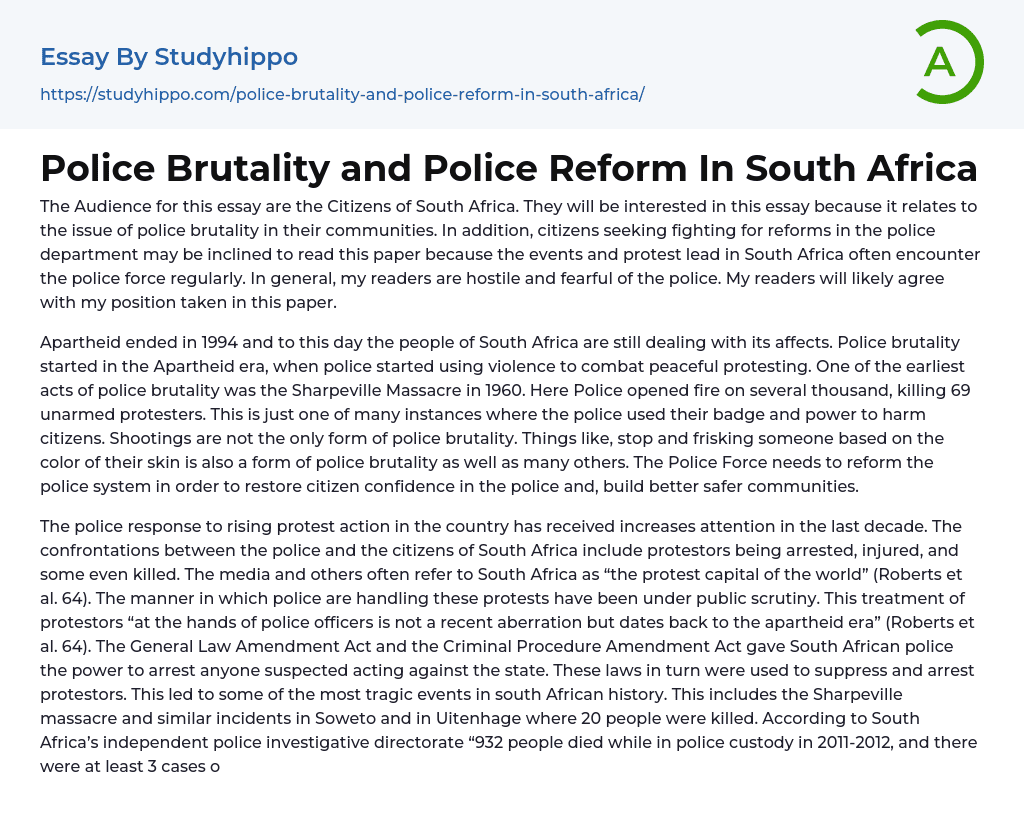

Police Brutality and Police Reform In South Africa Essay Example
The Audience for this essay are the Citizens of South Africa. They will be interested in this essay because it relates to the issue of police brutality in their communities. In addition, citizens seeking fighting for reforms in the police department may be inclined to read this paper because the events and protest lead in South Africa often encounter the police force regularly. In general, my readers are hostile and fearful of the police. My readers will likely agree with my position taken in this paper.
Apartheid ended in 1994 and to this day the people of South Africa are still dealing with its affects. Police brutality started in the Apartheid era, when police started using violence to combat peaceful protesting. One of the earliest acts of police brutality was the Sharpeville Massacre in 1960. Here Police opened f
...ire on several thousand, killing 69 unarmed protesters. This is just one of many instances where the police used their badge and power to harm citizens. Shootings are not the only form of police brutality. Things like, stop and frisking someone based on the color of their skin is also a form of police brutality as well as many others. The Police Force needs to reform the police system in order to restore citizen confidence in the police and, build better safer communities.
The police response to rising protest action in the country has received increases attention in the last decade. The confrontations between the police and the citizens of South Africa include protestors being arrested, injured, and some even killed. The media and others often refer to South Africa as “the protest capital of the world” (Roberts e
al. 64). The manner in which police are handling these protests have been under public scrutiny. This treatment of protestors “at the hands of police officers is not a recent aberration but dates back to the apartheid era” (Roberts et al. 64). The General Law Amendment Act and the Criminal Procedure Amendment Act gave South African police the power to arrest anyone suspected acting against the state. These laws in turn were used to suppress and arrest protestors. This led to some of the most tragic events in south African history. This includes the Sharpeville massacre and similar incidents in Soweto and in Uitenhage where 20 people were killed. According to South Africa’s independent police investigative directorate “932 people died while in police custody in 2011-2012, and there were at least 3 cases of police dragging citizens behind police vehicles” (Livingston 5).
These events over recent years have led the confidence in the police force by citizens to decrease tremendously. The South African Police service act of 1995 along with the new constitution attempted to support the SAP in their efforts to commit themselves to philosophy and practicing community policing. Despite their efforts “many remained skeptical of the polices post-apartheid transformation” (Boateng 768). In May 2000 police fatally shot a college student during protest on campus at the University of Durban Westville. This incident brought back “disappointment and distrust against the SAP once again” (Boateng 768). It is clear that the police are far from bring transformed and are relying back to their behaviors of excessive for and brutality during encounters with the public.
The basic obligation of a government and the police is to ensure the
safety of its citizens and when they fail to fulfil these obligations “the people effectively reclaim their right to use force in the resolution of disputes ,often with disastrous consequences” (Livingston 10). At Kenyatta University concert, a police officer shot and killed a security guard after the guard denied him entry to the student only event. Students then proceeded to beat the policeman to death. In events like this the “states institutions is weakened and public confidence is undermined” (Livingston 7).
Crime in South Africa poses challenges for safety, security, and development in the country. The combination of factors worsening crime in South Africa and its largely “ineffective and unaccountable police forces-has the potential of developing into a more serious” (Livingston 7) challenges to South Africa. Many studies in criminal justice and law have stated the importance of police legitimacy. Studies “have found that police legitimacy contributes to enhanced public cooperation and ultimately to effective crime control and prevention” (Boateng 768). A study by Tyler and Huo “(2002) shows that people who believe the police treat them fairly are more likely to accept police decision and to engage in desirable behaviors” (Boateng 768). Police reform is needed in order to restore the public’s faith in the Police force as well as create a better safer place.
- Jurisprudence essays
- Social Injustice essays
- Juvenile Justice essays
- A Policeman essays
- Agreement essays
- Business Law essays
- Common Law essays
- Community Policing essays
- Constitution essays
- Consumer Protection essays
- Contract essays
- Contract Law essays
- Copyright Infringement essays
- Court essays
- Crime essays
- Criminal Law essays
- Employment Law essays
- Family Law essays
- Injustice essays
- Judge essays
- Jury essays
- Justice essays
- Lawsuit essays
- Lawyer essays
- Marijuana Legalization essays
- Ownership essays
- Police essays
- Property essays
- Protection essays
- Security essays
- Tort Law essays
- Treaty essays
- United States Constitution essays
- War on Drugs essays
- Affirmative Action essays
- Assisted Suicide essays
- Capital Punishment essays
- Censorship essays
- Child Labour essays
- Child Protection essays
- Civil Rights essays
- Corporal Punishment essays
- Death Penalty essays
- Empowerment essays
- Euthanasia essays
- Gay Marriage essays
- Gun Control essays
- Human Trafficking essays
- Police Brutality essays
- Privacy essays



